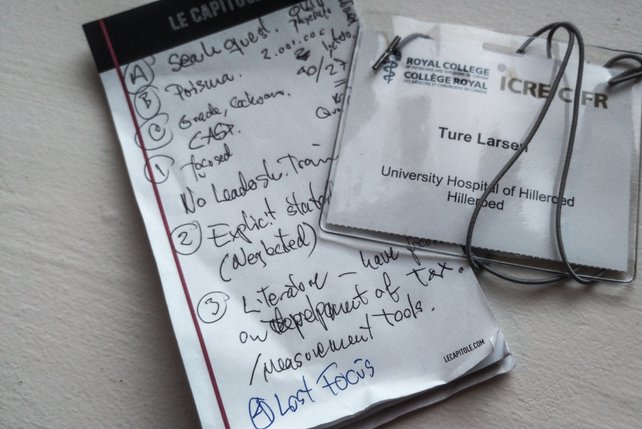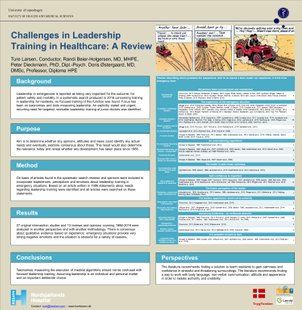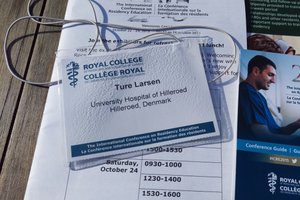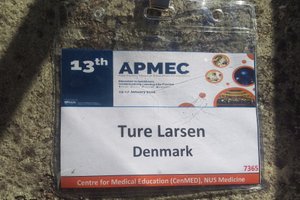PhD Project
Abstract for the PhD thesis:
Introduction: At university hospitals worldwide medical teachers find it difficult to get medical students to rise to the occation as leader of emergency medical teams. Lack of leadership ultimately has a negative effect on patient mortality. Knowledge and research in the last 30 years does not offer any useful solution for teaching workable leadership training. Although non-verbal communication has an impact on communication between individuals it has had very little attention.
In the past two hundred years orchestral conductors have been trained in non-verbal communication to lead and coordinate teams. Conductors, therefore, might have the required competence that is called for to optimize leadership in medical teams.
Aim of the study: To optimize leadership behavior in emergency medical teams. Endpoint: to improve team leadership in emergencies - ultimately to reduce patient mortality in acute clinical situations.
Research Question: Is it possible to strengthen the communication of clinical team leaders by teaching/transferring an orchestral conductor's nonverbal communication skills with the aim of improving collaboration of the team in the treatment of acute patients?
The following subprojects in the PhD work planned:
- Training residents to lead emergency teams: A Systematic Review
Abstract:
Introduction: Worldwide, medical supervisors find it difficult to get students to rise to the occasion as leaders of emergency teams: many residents/rescuers feel unprepared to adopt the leadership role in emergencies.
Purpose: to describe how literature addresses workable and operational leadership training for the emergency medical team-leader and to enhance understanding of leadership training in the medical environment
Background: It appears that many residents/rescuers feel unprepared to adopt the role as leader in emergencies. In spite of the knowledge acquired in 30 years of research, scientists are still seeking a solution as to how to teach workable leadership in healthcare.
Method: A systematic review was conducted (May-December 2016 in accordance with the PRISMA 2009 Checklist.
Results: 27 articles, by 25 single researchers, were considered primary and covered the period 1986-2016. No targeted leadership training for doctors was found. The majority of the research projects described different types of behavioural markers, taxonomies and checklists.
Conclusions: No consistent and targeted leadership training for young doctors was identified. Over the years, multiple taxonomies and assessment tools have been developed but failed to address leadership training.
Perspectives: The authors recommend that the training of leadership take another turn and include individual/personal feelings and perceptions of leadership addressing other issues in an unpredictable and stressful situation.
- Barriers, Challenges and Learning Goals concerning training residents to lead emergencies: a Qualitative Review
Abstract:
Introduction: Leadership in emergencies is reported as being very important for the patient outcome, for patient safety and mortality. In a systematic search produced in 2016 concerning training in leadership for residents, no focused training of this function was found.
Aim: The aim is to determine whether any opinions, attitudes and views could identify any actual challenges or barriers and eventually examine consensus about these. This result would also determine the relevance today and reveal whether any development has taken place since 1986.
Background: Focus has been on taxonomies and tools measuring leadership. An explicitly stated and urgent, recurring need for targeted, workable leadership training of junior doctors was identified.
Method: On basis of articles found in the systematic search reviews and opinions were included to incorporate experiences, perceptions and emotions about leadership training in emergency situations. Based on an article written in 1986 statements about challenges regarding leadership training were identified and all articles were searched on these statements.
Findings: 27 original intervention studies and 13 reviews and opinions covering 1986-2016 were analyzed in another perspective and with another methodology. There is consensus about qualitative evidence based on experience: emergency situations provoke very strong negative emotions and the situation is stressful for a variety of reasons.
Conclusions: Taxonomies measuring the execution of medical algorithms should not be confused with focused leadership training. Assuming leadership is an individual and personal matter and an important deliberate choice.
Perspectives: The literature recommends finding a solution to teach residents to gain calmness and confidence in stressful and threatening surroundings. The literature recommends finding a way to work with body language, non-verbal communication, attitude and appearance in order to radiate authority and credibility.
- Conducting the emergency team: A novel way to train the team-leader for emergencies
Abstract:
Introduction: Worldwide, medical supervisors find it difficult to get students to rise to the occasion when called upon to act as leaders of emergency teams: many residents/rescuers feel unprepared to adopt the leadership role. The challenge is to address the residents very strong emotions caused by the extremely stressful context. No systematic leadership training that takes this aspect into account.
Aim: The overall aim of the course is to investigate whether, in an emergency, a clinical team leader could apply a conductor’s leadership skills.
Background: An orchestral conductor is a specialist in practicing leadership focusing on non-verbal communication. The conductor works with highly trained specialists and must lead them to cooperate and put his interpretation into effect. The conductor works purposefully in order to appear calm, genuine and gain authority.
Method: A conductor and a consultant prepared a course for residents, medical students and nurses, n = 61. 10 x 2 course days were completed. The exercises were musical and thus safe for the students as there were no clinical skills at stake. The programme aimed to create stress and anxiety in a safe learning environment.
Results: The transfer of a conductor’s skills improved and profoundly changed the participating students’, nurses’ and residents’ behaviour and introduced a method to handle anxiety and show calmness and authority.
Perspectives: If this course in leadership are to be introduced as a compulsory part of the educating of doctors, the ideal time would be after clinical skills have been acquired, experience gained and routines understood in the clinic.
Politiken Article ... Podcast (24 minutes) Journalist Mikkel Vuroela, photographer Miriam Kristina Stubdrub Dalsgaard - march 2017
Publications: Team Management - Can music contribute to better understanding? MedEd Publish www.mededworld.org (Pilot project 2014) Read article
Supported by
Research Grant from Nordsjællands Hospital, June 2017












